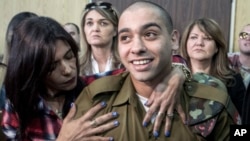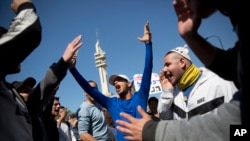An Israeli military court on Tuesday sentenced a young soldier to 18 months in prison, ending a long and turbulent trial that captivated the country and exposed its deep divisions. Elor Azaria, 20, was convicted of manslaughter in January for fatally shooting an incapacitated Palestinian assailant in the West Bank nearly a year ago.
The landmark case polarized the nation, pitting much of the public against Israel’s most prized and respected institution, the army. In a rare move, the military condemned a soldier’s actions during a Palestinian attack, while many ordinary people were appalled that an Israeli youth serving on the front lines was hauled into court like a common criminal.
The drama began last March in the biblical West Bank town of Hebron, when two Palestinians went on a stabbing rampage targeting Israeli troops. One assailant was shot dead by soldiers and the other was wounded, lying incapacitated on the ground.Eleven minutes later, a cellphone video caught Azaria taking aim at the 21-year-old injured Palestinian and shooting him in the head. The soldier claimed that he feared the man was booby-trapped with a bomb; but commanders quickly disputed that and Azaria was put on trial for violating the army’s code of moral conduct.
The 18-month sentence was considered lenient because the maximum penalty for manslaughter is 20 years.
“We took note of the harm suffered by his family,” said Colonel Maya Heller who headed the three-judge panel. She also noted that it was Azaria’s first real combat service in the field “in hostile territory.”
Nevertheless, hundreds of Azaria’s supporters who gathered at the courthouse were disappointed and broke out in angry chants condemning the army for abandoning one of its own.
“This sentence is an outrage!” said Ofer Golan who heads a national campaign on behalf of Azaria. “It is outrageous that a soldier, a hero of Israel, is going to prison for killing a terrorist.” He went on to quote an old rabbinical saying that, “If someone is coming to kill you, kill him first.”
The court, on the other hand, described Azaria’s actions as a disgrace. “The defendant shot a terrorist without any justification,” said Judge Heller. “The only value that was harmed by the defendant's actions was the value of life. Azaria also defiled the [concept of] ‘the purity of arms’ which is upheld by the Israel Defense Forces [IDF].”
Professor Asa Kasher, who co-authored the IDF’s Code of Ethics, says every combat soldier is well aware of the rules of engagement. “The soldiers should have encountered a norm that says a wounded enemy, a wounded terrorist from which no real danger emerges, should not be killed,” he said. “On the contrary, such a person should be medically treated.”
Palestinians condemned the sentence as lenient, saying it effectively allows Israeli soldiers to carry out summary executions with impunity.
“A year-and-a-half is a farce,” Yusri al-Sharif, the father of the slain Palestinian attacker, told reporters at the family home near Hebron. “What does a year-and-a-half mean? Was he an animal to be killed like this in such barbaric way?”
By contrast, Israelis widely believe that Azaria acted in legitimate self defense. One poll found that nearly half of Israeli Jews are of the opinion that any Palestinian attacker should be killed on the spot.
There is also strong support and sympathy for the young soldier in Israel’s right wing government, where many Cabinet ministers are calling for a pardon.
Azaria “was sent to defend the citizens of Israel when a terrorist wave of Palestinian knife attacks was at its peak,” said Minister Naftali Bennett of the hawkish Jewish Home party. “Even if he made a mistake, Elor must not have to serve time in prison.”





